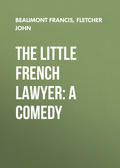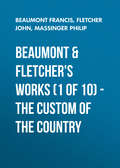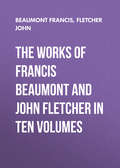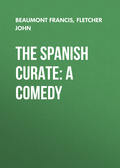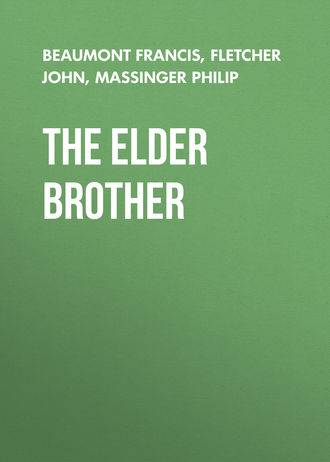
Beaumont Francis
The Elder Brother
Actus IV. Scaena II
Enter Miramont, Andrew.
Do they chafe roundly? And. As they were rubb'd with soap, Sir,
And now they sweare alowd, now calme again,
Like a ring of bells whose sound the wind still alters,
And then they sit in councel what to doe,
And then they jar againe what shall be done;
They talke of Warrants from the Parliament,
Complaints to the King, and forces from the Province,
They have a thousand heads in a thousand minutes,
Yet nere a one head worth a head of garlick.
Mir. Long may they chafe, and long may we laugh at 'em,
A couple of pure puppies yok'd together.
But what sayes the young Courtier Master Eustace,
And his two warlike friends? And. They say but little,
How much they think I know not; they looke ruefully,
As if they had newly come from a vaulting house,
And had beene quite shot through 'tween winde and water
By a she Dunkirke, and had sprung a leake, Sir.
Certaine my master was too blame. Mir. Why Andrew?
And. To take away the Wench oth' sudden from him,
And give him no lawful warning, he is tender;
And of a young girles constitution, Sir,
Readie to get the greene sickness with conceit;
Had he but tane his leave innavailing language,
Or bought an Elegie of his condolement,
That th' world might have tane notice, he had beene
An Asse, 't had beene some favour. Mir. Thou sayest true,
Wise Andrew, but these Schollars are such things
When they can prattle. And. Very parlous things Sir.
Mir. And when they gaine the Libertie to distinguish
The difference 'twixt a father and a foole,
To looke below and spie a younger brother
Pruning up and dressing up his expectations
In a rare glasse of beauty, too good for him:
Those dreaming Scholars then turne Tyrants, Andrew,
And shew no mercy. And. The more's the pittie, Sir.
Mir. Thou told'st me of a trick to catch my brother,
And anger him a little farther, Andrew,
It shall be onely anger I assure thee,
And little shame. And. And I can fit you, Sir;
Hark in your eare. Mir. Thy wife? And. So I assure ye;
This night at twelve a clock. Mir. Tis neat and handsome;
There are twentie Crownes due to thy project Andrew;
I've time to visit Charles, and see what Lecture
He reades to his Mistresse. That done, Ile not faile
To be with you. And. Nor I to watch my Master— Exeunt.
Actus IV. Scaena III
Angellina, Sylvia, with a taper.
I'me worse than ere I was; for now I feare,
That that I love, that that I onely dote on;
He followes me through every roome I passe,
And with a strong set eye he gazes on me,
As if his spark of innocence were blowne
Into a flame of lust; Vertue defend me.
His Uncle to is absent, and 'tis night;
And what these opportunities may teach him—
What feare and endlesse care tis to be honest!
To be a maide, what miserie, what mischiefe!
Would I were rid of it, so it were fairlie.
Syl. You need not feare that, will you be a childe still?
He followes you, but still to looke upon you;
Or if he did desire to lie with ye,
Tis but your owne desire, you love for that end;
Ile lay my life, if he were now abed w'ye,
He is so modest, he would fall a sleepe straight.
Ang. Dare you venter that? Syl. Let him consent, and have at ye;
I feare him not, he knowes not what a woman is,
Nor how to find the mysterie men aime at.
Are you afraid of your own shadow, Madam?
Ang. He followes still, yet with a sober face; Would I might know the worst, and then I were satisfied.
Syl. You may both, and let him but goe with ye.
Cha. Why doe you fle me? What have I so ill About me or within me to deserve it?
Ang. I am going to bed Sir. Cha. And I am come to light ye; I am a maide, and 'tis a maidens office.
Ang. You may have me to bed Sir, without a scruple, And yet I am charie too who comes about me. Two Innocents should not feare one another.
Syl. The Gentleman sayes true. Pluck up your heart, Madam.
Cha. The glorious Sun both rising and declining
We boldly looke upon; even then sweet Ladie,
When like a modest bride he drawes nights curtaines,
Even then he blushes, that men should behold him.
Ang. I feare he will perswade me to mistake him.
Syl. Tis easily done, if you will give your minde to't.
Ang. Pray ye to your bed. Cha. Why not to yours, dear Mistress,
One heart and one bed. Ang. True Sir, when 'tis lawful;
But yet you know— Cha. I would not know, forget it;
Those are but sickly loves that hang on Ceremonie,
Nurst up with doubts and feares, ours high and healthful,
Full of beleefe, and fit to teach the Priest;
Love shall seale first, then hands confirme the bargaine.
Ang. I shall be an Heretique if this continue. What would you doe a bed? you make me blush, Sir.
Cha. Ide see you sleepe, for sure your sleepes are excellent
You that are waking such a noted wonder,
Must in your slumber prove an admiration:
I would behold your dreames too, if't were possible;
Those were rich showes. Ang. I am becomming Traitor.
Cha. Then like blew Neptune courting of an Hand,
Where all the perfumes and the pretious things
That wait upon great Nature are laid up,
Ide clip it in mine armes, and chastly kiss it,
Dwell in your bosome like your dearest thoughts,
And sigh and weepe. Ang. I've too much woman in me.
Cha. And those true teares falling on your pure Chrystals, Should turne to armelets for great Queenes 't adore.
Ang. I must be gone. Cha. Do not, I will not hurt ye;
This is to let you know, my worthiest Lady,
Y'have clear'd my mind, and I can speak of love too;
Feare not my manners, though I never knew
Before these few houres what a beautie was,
And such a one that fires all hearts that feele it;
Yet I have read of vertuous temperance,
And studied it among my other secrets,
And sooner would I force a separation
Betwixt this Spirit and the case of flesh,
Than but conceive one rudeness against chastitie.
An[g]. Then we may walk. Cha. And talk of any thing,
Any thing fit for your eares, and my language;
Though I was bred up dull I was ever civil;
Tis true, I have found it hard to looke on you,
And not desire; Twil prove a wise mans task;
Yet those desires I have so mingled still
And tempered with the quality of honour,
That if you should yeeld, I should hate you for't.
I am no Courtier of a light condition,
Apt to take fire at every beautious face.
That onely serves his will and wantonness,
And lets the serious part run by
As thin neglected sand. Whitness of name,
You must be mine; why should I robbe my selfe
Of that that lawfully must make me happy?
Why should I seeke to cuckold my delights,
And widow all those sweets I aime at in you?
We'l loose our selves in Venus groves of mirtle
Where every little bird shall be a Cupid,
And sing of love and youth, each winde that blowes
And curles the velvet leaves shall breed delights,
The wanton springs shall call us to their bankes,
And on the perfum'd flowers wee'l feast our senses,
Yet wee'l walk by untainted of their pleasures,
And as they were pure Temples wee'l talk in them.
Ang. To bed, and pray then, we may have a faire end
Of our faire loves; would I [w]ere worthy of you,
Or of such parents that might give you thankes;
But I am poore in all but in your love.
Once more, good night. Cha. A good night t'ye, and may
The dew of sleepe fall gently on you, sweet one,
And lock up those faire lights in pleasing slumbers;
No dreames but chast and cleare attempt your fancie,
And break betimes sweet morne, I've lost my light else.
Ang. Let it be ever night when I lose you.
Syl. This Scholar never went to a Free-Schoo[le], he's so simple
[Enter a servant.]
Ser. Your brother with two Gallants is at dore, Sir And they're so violent, they'l take no denial.
Ang. this is no time of night. Cha. Let 'em in Mistresse.
Serv. They stay no leave; Shall I raise the house on 'm?
Cha. Not a man, nor make no murmur of't, I charge ye.
Enter Eustace, Egremont, Cowsy.
Th'are here, my Uncle absent, stand close to me.
How doe you brother with your curious story?
Have you not read her yet sufficiently?
Cha. No, brother, no, I stay yet in the Preface; The stile's too hard for you. Eust. I must entreat her. Shee's parcel of my goods. Cha. Shee's all when you have her.
Ang. Hold off your hands, unmannerly, rude Sir; Nor I, nor what I have depend on you.
Cha. Do, let her alone, she gives good counsel; doe not Trouble your selfe with Ladies, they are too light; Let out your land, and get a provident Steward.
Ang. I cannot love ye, let that satisfie you; Such vanities as you are to be laught at.
Eust. Nay, Then you must goe, I must claime mine owne.
Both. A way, a way with her. Cha. Let her alone, [She strikes off Eustace's hat] Pray let her alone, and take your coxcombe up: Let me talk civilly a while with you brother. It may be on some termes I may part with her.
Eust. O; is your heart come downe? what are your termes, Sir?
Put up, put up. Cha. This is the first and cheifest,
[Snatches away his sword.]
Let's walk a turne; now stand off fooles, I advise ye,
Stand as far off as you would hope for mercy:
This is the first sword yet I ever handled,
And a sword's a beauteous thing to looke upon,
And if it hold, I shall so hunt your insolence:
Tis sharp I'm sure, and if I put it home,
Tis ten to one I shall new pink your Sattins:
I find I have spirit enough to dispose of it,
And will enough to make ye all examples;
Let me tosse it round, I have the full command on't:
Fetch me a native Fencer, I defie him;
I feele the fire of ten strong spirits in me.
Doe you watch me when my Uncle is absent?
This is my griefe, I shall be flesht on Cowards;
Teach me to fight, I willing am to learne.
Are ye all gilded flies, nothing but shew in ye?
Why stand ye gaping? who now touches her?
Who calls her his, or who dares name her to me?
But name her as his owne; who dares look on her?
That shall be mortal too; but think, 'tis dangerous.
Art thou a fit man to inherit land,
And hast no wit nor spirit to maintaine it?
Stand still thou signe of man, and pray for thy friends,
Pray heartilie, good prayers may restore ye.
Ang. But doe not kill 'em Sir. Cha. You speak too late, Deare,
It is my first fight, and I must doe bravely,
I must not looke with partial eyes on any;
I cannot spare a button of these Gentlemen;
Did life lye in their heel Achilles like,
Ide shoot my anger at those parts and kill 'um.
Who waits within? Ser. Sir. Cha. View all these, view 'em well
Goe round a bout 'em and still view their faces,
Round about yet; See how death waits upon 'em,
For thou shall never view 'em more. Eust. Pray hold, Sir.
Cha. I cannot hold, you stand so fair before me,
I must not hold 'twill darken all my glories.
Goe to my Uncle, bid him poste to the King,
And get my pardon instantly, I have need on't.
Eust. Are you so unnatural? Cha. You shall die last Sir, Ile talke thee dead, thou art no man to fight with. Come, will ye come? me thinkes I've fought whole battailes.
Cow. We have no quarel to you, that we know on, Sir.
Egre. Wee'l quit the house and ask ye mercie too:
Good Ladie, let no murther be done here;
We came but to parly. Cha. How my sword
Thirsts after them? stand away Sweet. Eust. Pray Sir,
Take my submission, and I disclaime for ever.
Cha. Away ye poore things, ye despicable Creatures!
Doe you come poste to fetch a Ladie from me,
From a poore Schoole-boy that ye scorn'd of late?
And grow lame in your hearts when you should execute?
Pray take her, take her, I am weary of her;
What did ye bring to carrie her. Egre. A Coach and four horses.
Cha. But are they good? Egre. As good as France can shew Sir.
Cha. Are you willing to leave those, and take your safeties? Speak quickly. Eust. Yes with all our hearts. Cha. Tis done then. Many have got one horse, I've got foure by th' bargaine.
Enter Miramont.
Mi. How Now, who's here. Ser. Nay Now, y'are gon without bail.
Mir. What, drawne my friends! Fetch me my two-hand sword; I will not leave a head on your shoulders, Wretches.
Eust. In troth Sir, I came but to doe my dutie.
Both. And we to renew our loves. Mir. Bring me a blanket.
What came they for? Ang. To borrow me a while, Sir;
But one that never fought yet has so curried,
So bastina[d]o'd them with manly carriage,
They stand like things Gorgon had turn'd to stone;
They watch'd your being absent, and then thought
They might doe wonders here, and they have done so?
For by my troth, I wonder at their coldness,
The nipping North or frost never came neere them,
St. George upon a Signe would grow more sensible:
If the name of honour were for ever to be lost,
These were the most sufficient men to doe it
In all the world, and yet they are but young,
What will they rise to? They're as full of fire
As a frozen Glo-wormes ratle, and shine as goodly;
Nobilitie and patience are match'd rarely
In these three Gentlemen, they have right use on't;
They'l stand still for an houre and be beaten.
These are the Anagrammes of three great Worthies.
Mir. They will infect my house with cowardize,
If they breathe longer in it; my roofe covers
No baffl'd Monsieurs, walk and aire your selves;
As I live, they stay not here, while liver'd wretches
Without one word to ask a reason why,
Vanish, 'tis the last warning, and with speed,
For if I take ye in hand I shall dissect you,
And read upon your flegmatick dull carcases.
My horse againe there: I have other business,
Which you shall heare hereafter and laugh at it.
Good night Charles, faire goodness to you dear Ladie
Tis late, 'tis late. Ang. Pray Sir be careful of us.
Mir. It is enough, my best care shall attend ye. Exeunt.
Actus IV. Scaena IV
Enter Andrew.
Are you come old Master? very good, your horse
Is well set up, but ere ye part, Ile ride you
And spur your reverend Justiceship such a question,
As I shall make the sides of your reputation bleed,
Trulie I will. Now must I play at Bo-peep—
A banquet—well, Potatoes and Eringoes,
And as I take it, Cantharides,—Excellent,
A Priapisme followes, and as Ile handle it,
It shall old lecherous Goat in authoritie.
Now they begin to bill; how he slavers her!
[G]ramercie Lilly, she spits his kisses out,
And now he offers to fumble she fals off,
(That's a good Wench) and cries fair play above boord
Who are they in the corner? As I live,
A covey of Fidlers; I shall have some musick yet
At my making free oth' Companie of Horners;
There's the comfort, and a Song too! He beckons for one—
Sure 'tis no Anthem nor no borrowed rhymes
Out of the Schoole of vertue; I will listen— A Song.
This was never penn'd at Geneva, the note's too spritely.
So, so, the musicke's paid for, and now what followes?
O that Monsieur Miramont would but keep his word.
Here were a feast to make him fat with laughter,
At the most 'tis not six minutes riding from his house,
Nor will he break I hope—O are you come Sir?
The prey is in the net and will break in
Upon occasion. Mir. Thou shall rule me Andrew.
O th' infinite fright that will assaile this Gentleman!
The quarterns, tertians, and quotidians
That will hang like Sargeants on his worships shoulders!
The humiliation of the flesh of this man!
This grave austere man will be wondred at.
How will those solemne lookes appeare to me;
And that severe face, that speak chaines and shackles?
Now I take him in the nick, ere I done with him,
He had better have stood between two panes of wainscot;
And made his recantation in the market,
Than heare me conjure him. And. He must passe this way,
To th' onely bed I have, he comes, stand close.
Bri. Well done, well done, give me my night-cap. So.
Quick, quick, untruss me; I will truss and trounce thee;
Come Wench a kiss between each point; kiss close;
It is a sweet Parenthesis. Lil. Y'are merry Sir.
Bri. Merry I will be anon, and thou shall feele it, Thou shall my Lilly. Lil. Shall I aire your bed, Sir?
Bri. No, no, Ile use no warming pan but thine, Girle; That's all; Come kiss me again. Lil. Ha'ye done yet?
Bri. No, but I will doe, and doe wonders, Lilly.
Shew me the way. Lil. You cannot misse it, Sir;
You shall have a Cawdle in the morning, for
Your worships breakfast. Bri. How, ith' morning. Lilly?
Th'art such a wittie thing to draw me on.
Leave fooling, Lilly, I am hungry now,
And th' hast another Kickshaw, I must tast it.
Lil. Twill make you surfet, I am tender of you: Y'have all y'are like to have. And. And can this be earnest?
Mir. it seemes so, and she honest. Bri. Have I not
Thy promise Lilly? Lil. Yes and I have performed
Enough to a man of your yeares, this is truth,
And you shall find Sir, you have kist and tows'd me,
Handled my legg and foote, what would you more, Sir,?
As for the rest, it requires youth and strength,
And the labour in an old man would breed Agues,
Sciaticaes, and Cramps; you shall not curse me,
For taking from you what you cannot spare, Sir:
Be good unto your selfe, y'ave tane alreadie
All you can take with ease; you are past threshing,
It is a worke too boisterous for you; leave
Such drudgerie to Andrew. Mir. How she jeeres him?
Lil. Let Andrew alone with his owne tillage,
Hee's tough, and can manure it. Bri. Y'are a queane,
A scoffing jeering quean. Lil. It may be so, but
I'me sure, Ile nere be yours. Bri. Doe not provoke me,
If thou do'st, Ile have my Farm againe, and turne
Thee out a begging. Lil. Though you have the will,
And want of honestie to deny your Deed, Sir,
Yet I hope Andrew has got so much learning
From my young Master, as to keep his own;
At the worst, Ile tell a short tale to the Judges,
For what grave ends you sign'd your Lease, and on
What termes you would revoke it. Bri. Whore thou dar'st not.
Yeeld or Ile have thee whipt; How my bloud boiles,
As if t'were ore a furnace! Mir. I shall coole it.
Bri. Yet gentle Lilly, pitie and forgive me, Ile be a friend t'ye, such a loving bountiful friend—
Lil. To avoid suites in Law, I would grant a litle,
But should fierce Andrew know it, what would become
Of me? And. A whore, a whore! Bri. Nothing but well Wench,
I will put such a strong bit in his mouth,
As thou shalt ride him how thou wilt, my Lilly:
Nay, he shall hold the doore, as I will worke him,
And thank thee for the office. Mir. Take heed Andrew,
These are shrewd temptations. And. Pray you know
Your Cue, and second me Sir; By your Worships favour.
Bri. Andrew! And. I come in time to take possession
Of th' office you assigne me; hold the doore,
Alas 'tis nothing for a simple man
To stay without when a deepe understanding
Holds conference within, say with his wife:
A trifle Sir, I know I hold my farme
In Cuckolds Tenure: you are Lord o'the soile Sir,
Lilly is a Weft, a Straie shee's yours, to use Sir,
I claime no interest in her. Bri. Art thou serious?
Speak honest Andrew, since thou hast oreheard us,
And wink at small faults, man; I'me but a pidler,
A little will serve my turne; thou'lt finde enough
When I've my bellyfull; wilt thou be private
And silent? And. By all meanes, Ile onely have
A Ballad made of't, sung to some lewd Tune,
And the name of it shall be Justice Trap,
It will sell rarely with your Worships name,
And Lillies on the top. Bri. Seek not the ruine
O' my reputation, Andrew. And. Tis for your credit,
Monsieur Brisac printed in capital letters,
Then pasted upon all the posts in Paris.
Bri. No mercy, Andrew? And. O, it will proclaim you From th' Citie to the Court, and prove sport royal.
Bri. Thou shall keep thy Farm. Mir. He does afflict him rarely.
And. You trouble me. Then his intent arriving, The vizard of his hypocrisie poll'd off To the Judge criminal. Bri. O, I am undone.
And. Hee's put out of Commission with disgrace,
And held uncapable of bearing Office
Ever hereafter. This is my revenge,
And this Ile put in practice. Bri. Doe but heare me.
And. To bring me back from my Grammer to my horne-book, It is unpardonable. Bri. Do not play the Tyrant; Accept of composition. Lil. Heare him, Andrew.
And. What composition? Bri. Ile confirme thy farme,
And add unto't an hundred acres more
Adjoyning to it. And. Umb, This mollifies,
But y'are so fickle: and will again denie this,
There being no witness by. Bri. Call any witness,
Ile presently assure it. And. Say you so,
Troth there's a friend of mine Sir, within hearing,
That is familiar with all that's past,
His testimonie will be authentical.
Bri. will he be secret? And. You may tye his tongue up. As you would doe your purse-strings. Br. Miramont. M. Ha, Ha, Ha.
And. this is my witness. Lord how you are troubled?
Sure, y'have an ague, you shake so with choler;
Hee's your loving brother Sir, and will tell no bodie
But all he meets, that you have eate a snake,
And are grown young, gamesom, and rampant. Bri. Caught thus?
And. If he were one that would make jests of you,
Or plague ye with making your religious gravitie
Ridiculous to your neighbours, Then you had
Some cause to be perplex'd. Bri. I shall become
Discourse for Clowns and Tapsters. And. Quick, Lilly, Quick,
Hee's now past kissing, between point and point.
He swounds, fetch him some Cordiall—Now put in Sir.
Mir. Who may this be? sure this is some mistake:
Let me see his face, weares he not a false beard?
It cannot be Brisac that worthie Gentleman,
The pillar and the patron of his Countrie;
He is too prudent and too cautelous,
Experience hath taught him t'avoid these fooleries,
He is the punisher and not the doer,
Besides hee's old and cold, unfit for woman;
This is some Counterfeit, he shall be whipt for't,
Some base abuser of my worthie brother.
Bri. Open the doores, will ye'imprison me? are ye my Judges?
Mir. The man raves! This is not judicious Brisac: Yet now I think on't, a' has a kinde of dog looke Like my brother, a guiltie hanging face.
Bri. Ile suffer bravely, doe your worst, doe, doe.
Mir. Why, it's manly in you. Bri. Nor will I raile nor curse,
You slave, you whore, I will not meddle with you,
But all the torments that ere fell on men,
That fed on mischiefe, fall heavily on you all. Exit.
Lil. You have giv'n him a heat, Sir. Mir. He will ride you The better, Lil. And. Wee'l teach him to meddle with Scholars.
Mir. he shall make good his promise t'increase thy Farm, Andrew
Or Ile jeere him to death, feare nothing Lilly,
I am thy Champion. This jeast goes to Charles,
And then Ile hunt him out, and Monsieur Eustace
The gallant Courtier, and laugh heartily
To see'm mourne together. And. Twill be rare, Sir. Exeunt.



